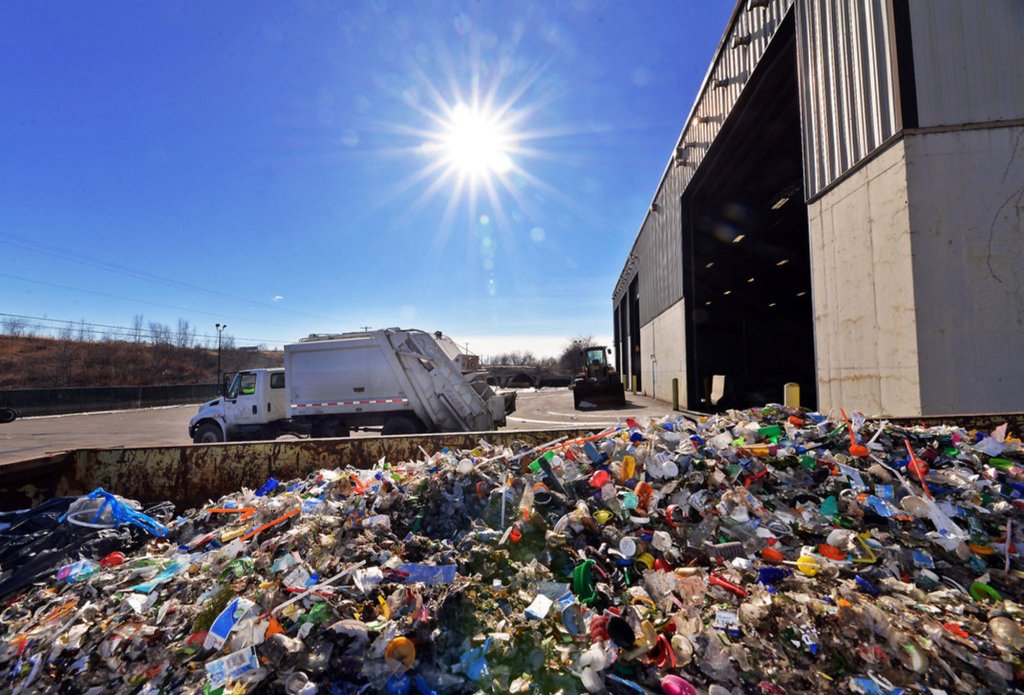You probably see them every day – blue and green colored waste bins, full of plastic water bottles, aluminum cans, and cardboard. They line our roads, coexist side by side with waste cans, and are often conveniently located throughout malls, universities and other public spaces.
But despite the prevalence of recycling bins on curbsides and in daily life, did you know that only around 10% of plastic is successfully recycled?
What happens to the rest? Most end-of-use plastics go to landfills and some litter our roads, landscapes and waterways. As a society, we can and must do better. However, solutions around plastics first must be grounded in reality.
First, eliminating plastics isn’t a feasible pathway. The durability and versatility of plastics make them an essential component in most items and technological advances that improve modern life quality. Everything from medical devices, food packaging, military equipment, electronics, vehicles, aviation, renewables and more all rely on durable plastics.
A recent economic analysis by the American Chemistry Council found that nearly 27% of all U.S. manufacturing output comes from sectors where plastics constitute 5% or more of material inputs.
Second, we need to start looking at end-of-life plastics as commodities or resources rather than waste — because they are. Advancements in emerging technologies and innovations allow for the broader reuse of plastics, reducing waste and increasing recycling rates. To move recycling solutions forward, we need a long-term strategy to modernize recycling infrastructure and encourage investments in innovative technology solutions.
This summer, the Congressional Energy and Commerce Committee held a hearing to discuss improvements to recycling infrastructure and ways federal and state policies and regulations can improve recycling performance. Consensus from the hearing is that action is long overdue. Our recycling infrastructure hasn’t been upgraded in decades, impacting the environment and undermining the availability of sustainable materials that several industries increasingly rely on.
In Pennsylvania, manufacturing plays a vital role in the state’s economy. The demand for recycled feedstock materials to utilize in existing manufacturing processes is greatly increasing as companies advance aggressive sustainability priorities driven by consumers and investors.
In 2020, Pennsylvania legislators advanced bipartisan legislation to correctly classify advanced recycling technologies as manufacturing. This action was a big step in the right direction; however, more work is needed to modernize our outdated recycling infrastructure, including a more robust adoption of advanced recycling technologies.
Advanced recycling breaks down end-of-life plastics through a variety of processes to convert them into base chemical materials that can be used by manufacturers to make new products. While robust markets exist for recycling plastics such as bottles and containers, advanced recycling technologies open the door to expanding the types of plastics we can recycle. Increasing recycling rates decreases waste going to landfills and the environment and increases the sustainable materials manufacturers can use to make the products we all rely on for modern living. This would be an enormous benefit for the environment.
There is also a tremendous economic opportunity for Pennsylvania. Since 2017, companies have invested upwards of $9 billion in advanced recycling projects to redefine the plastics lifecycle and drive innovation. These investments are expected to significantly increase as technologies advance and sustainable materials demand increases.
For perspective, think about how electronics like cell phones and laptops and the rapid growth in the electric vehicle market have evolved over the last 15 years.
Scaling advanced recycling to meet U.S. demand could establish over 150 facilities, creating nearly 50,000 direct and supply chain jobs. This would generate an estimated $3 billion in annual wages and nearly $13 billion in annual economic output.
Pennsylvania is uniquely positioned to lead this charge. By building on the bipartisan progress already made, we can become a hub for the next generation of recycling and sustainable manufacturing. Modernizing our infrastructure and encouraging investment in advanced recycling is not just an environmental win — it is a powerful economic catalyst that will create thousands of jobs, generate billions in economic output and secure our place as a leader in both innovation and sustainability. The opportunity is here, and the time for a long-term, comprehensive strategy is now.
This is a contributed opinion column. Darlene Robbins is the president of Northeast PA Manufacturers & Employers Association and Council. The views expressed in this piece are those of its individual author, and should not be interpreted as reflecting the views of this publication. Do you have a perspective to share? Learn more about how we handle guest opinion submissions at themorningcall.com/opinions.
